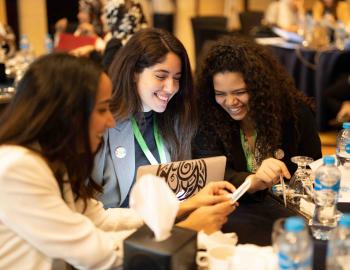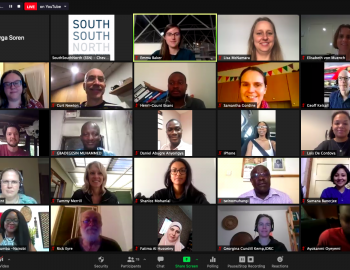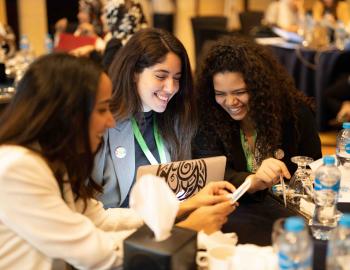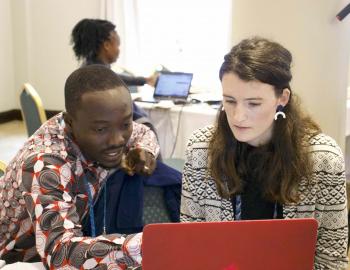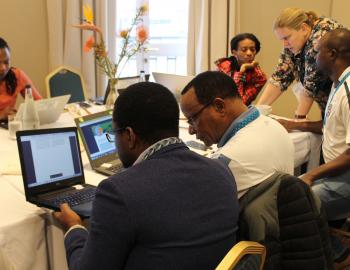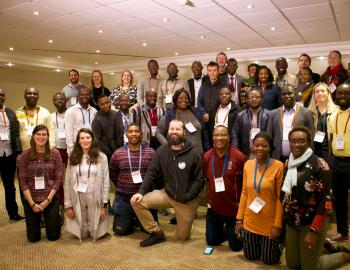Using Wikipedia to enhance global knowledge on climate change
Using Wikipedia to enhance global knowledge on climate change
Context
Wikipedia is the single most used open access source of information in the world, and is a cornerstone of the global knowledge commons. For climate change, over the last year alone there were approximately 112 million pageviews of climate change related Wikipedia pages (from December 2019 to December 2020).
Despite this widespread reach of Wikipedia’s content, to-date the platform has been significantly under-estimated as a tool to make climate change information more accessible and relevant to practitioners and policymakers. However, Wikipedia lacks diversity both in terms of who contributes to the platform and the nature of the content. Only about 20% of Wikipedia editors are female, and it is thought around 20% are from the global South. Africa in particular has the fewest Wikipedia contributors per capita of any other region. A 2014 survey found that Africa contributes only about 1.3% of the world’s edits on the platform on a monthly basis.
Within this context, CDKN identified Wikipedia as a powerful tool to ensure that the climate-related information in the online global knowledge commons is reliable, up-to-date and reflects how diverse countries and communities around the world are affected by, and are responding to, the climate crisis.
Project objectives
- Enhance the quality and accessibility of information on climate change on Wikipedia, the world’s largest online encyclopedia, particularly related to the global South;
- Enhance the confidence and skills of climate change researchers and practitioners to edit Wikipedia, especially women and those from the global South;
- Increase awareness amongst climate change researchers and practitioners of the value of contributing to the platform; and
- Build a community of climate change editors, particularly women and editors from the global South.
Project activities
In collaboration with Future Climate for Africa (FCFA) and the Wikimedia Foundation, CDKN hosted two edit-a-thons in 2019 and 2020, and compiled a guide for researchers, communicators and practitioners on how to get started with Wikipedia.
- Africa’s first edit-a-thon on climate change in August 2019 helped to tackle what’s been called the ‘Africa gap’ on Wikipedia. This three-day face-to-face event brought together 30 African researchers from East, West and Southern Africa representing 10 countries: Ghana, Senegal, Côte d’Ivoire, Kenya, Namibia, Botswana, Tanzania, Uganda, Zimbabwe and South Africa. Over the three days the researchers tackled some major gaps on Wikipedia where Africa-related content was lacking, working in groups to use the opportunity to leverage their collective knowledge and understanding to edit larger topics on existing Wikipedia pages such as Climate change in Africa, climate change adaptation, climate change and agriculture and drylands.
- Wiki4Climate: A week of editing climate change topics on Wikipedia was held online over seven days from 23 November to 1 December 2020. 275 people from over 60 countries signed up and 68 participants actively edited during the event - 72% of whom were from the global South and 51% were women. The largest number of participants were from Nigeria, South Africa, Ghana, Kenya, Lebanon and India. Over 200 climate change-related pages were improved and five new ones created (see the event dashboard for more information).
- Our “how to” guide on contributing climate change information to Wikipedia provides step-by-step guidance on how to edit articles on Wikipedia, along with tips and suggestions on style and structure to make the editing process a smooth one. The guide also provides suggestions for how to get involved with the Wikipedia editing community, and shares CDKN’s experiences organising an edit-a-thon.
Project outputs
The key project outputs are:
- A video from Africa’s first edit-a-thon on climate change in August 2019
- How to contribute climate change information to Wikipedia: A guide for researchers, practitioners and communicators - a “how to” guide for contributing to Wikipedia (in English and Spanish)
- A webinar launching the guide in November 2020
- Training videos from Wiki4Climate
- An opinion piece from a Wiki4Climate participant entitled Why I believe climate change researchers should contribute to Wikipedia
Project recognition
Our Wikipedia project was shortlisted as one of three finalists in the CMCC climate change communication award in September 2021.

